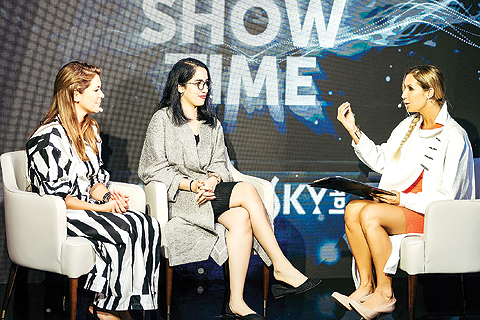The fusion of fashion and technology is a reminder of the rising influence of technology on design, and the ubiquity of creativity across sectors. Our modern and highly connected world gave rise to the concept of 'Digital Art', wherein art is created and stored digitally. As a security company, Kaspersky Lab not only monitors trends in the cyber space, but also constantly transforms its threat intelligence and security expertise into next generation security solutions. The same way artists and designers transform their creativity and imagination into pieces of clothes that will be worn by people in coming seasons.
In order to literally showcase the connection between art and technology, Kaspersky Lab has partnered with Emirati designer Ayten Al-Khayat, who took her inspiration from technology to create a special collection sought to express the world of digital code, gadgets, and smart devices through cloth and texture, forms and femininity - with a flavor of Arabic culture.
Ayten Al-Khayat, Fashion Designer and owner of Raw by Ayten commented: "When first ideating this collection, it was certainly a challenge as I've never delved this deeply into technology before. As I progressed with sketching and continued researching, however, I was surprised to see the many similarities between our professional interests, such as having an eye for detail, and following the latest trends in order to create something appealing to customers."
Artistry comes in many forms and, in the field of cybersecurity artistry is always staying a step ahead of cybercriminals and developing cutting edge security solutions that are advanced and forward looking. Thus, the company's portfolio has been upgraded with a completely new consumer product - a patented adaptive security service called Kaspersky Security Cloud, which has the ability to adapt to your lifestyle to keep you safe online.
Individuality applies to our online behavior as well, therefore, each person's online behavior differs from others. This is why Kaspersky Lab experts invented this unique patented solution Kaspersky Security Cloud. This soltuion combines all the best elements of the company's flagship solutions, including the market leading protection against cyberthreats, and adaptive "scenarios". Adaptivity means that the service offers protection exactly when it is needed, depending on the individual's behavior and the device they use.
Kaspersky Security Cloud operates according to the unique security-as-a-service scheme. It is "attached" not to the device, but to its owner via their account on the My Kaspersky portal. In addition, the service is available on both an annual and monthly* subscription basis. However, the uniqueness of the solution lies in the fact that, with the appropriate settings, the product behaves like an "adviser" that promptly tells you what to do in order to maintain a connection when it is most needed, or to avoid jeopardizing your personal data when such a risk occurs. Thus, the new adaptive service allows people to always stay connected while ensuring that their data is protected.
"While developing Kaspersky Security Cloud, we were guided by the desire to create a service that could provide the right protection at the right time. Each person has their own domain, which means each person needs special protection that suits their unique digital lifestyle. We believe that the future lies with security solutions that will adapt to the individual, to each member of their family, to their environment and behavior. Kaspersky Security Cloud is our first step towards this future", says Aman Manzoor, Head of Consumer Sales in the Middle East, Turkey and Africa at Kaspersky Lab.
Kaspersky Security Cloud starts to be available in the Middle East on November 8th. There will be several versions of the solution: the free version has a limited number of scenarios, it only applies to one account and three devices at a time, while the Personal version provides full service functionality for one account and five devices. The Family version covers up to 20 accounts and up to 20 devices.











